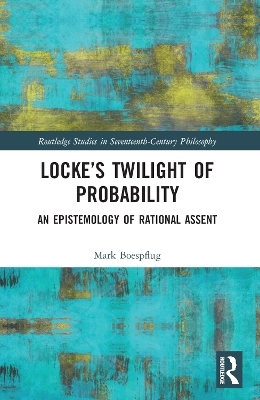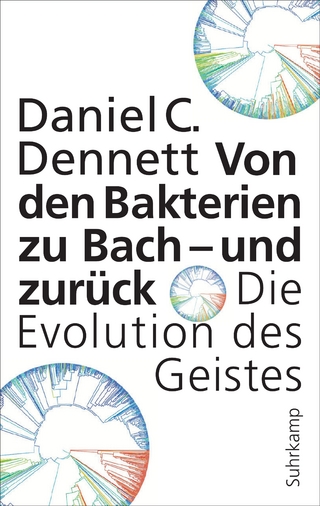
Locke’s Twilight of Probability
An Epistemology of Rational Assent
Seiten
2024
Routledge (Verlag)
978-1-032-29384-4 (ISBN)
Routledge (Verlag)
978-1-032-29384-4 (ISBN)
This book provides a systematic treatment of Locke’s theory of probable assent. It shows how the theory applies to Locke’s philosophy of science, moral epistemology, and religious epistemology.
This book provides a systematic treatment of Locke’s theory of probable assent, and shows how the theory applies to Locke’s philosophy of science, moral epistemology, and religious epistemology.
There is a powerful case to be made that the most important dimension of Locke’s philosophy is his theory of rational probable assent, rather than his theory of knowledge. According to Locke, we largely live our lives in the “twilight of probability” rather than in “the sunshine of certain knowledge.” Locke’s theory of probable assent has far-reaching significance insofar as it contains a wealth of novel, independently interesting, and prescient elements that precede the modern field of formal epistemology. In this book, the author argues for the central role of probable assent in Locke’s philosophy. Locke’s theory of probable assent is based on an epistemic modesty that claims, roughly, that our cognitive abilities are limited and that we ought to carry ourselves in believing with due caution. This modesty motivates the author’s discussion of other aspects of Locke’s epistemology, notably his principle of proportionality, his doxastic involuntarism, his epistemological pragmatism, and his theory of testimony. The book concludes by connecting the theory of probable assent with Locke’s views on the limits of science, moral epistemology, and the rationality of faith.
Locke’s Twilight of Probability will appeal to scholars and advanced students working on Locke and the history of early modern philosophy.
This book provides a systematic treatment of Locke’s theory of probable assent, and shows how the theory applies to Locke’s philosophy of science, moral epistemology, and religious epistemology.
There is a powerful case to be made that the most important dimension of Locke’s philosophy is his theory of rational probable assent, rather than his theory of knowledge. According to Locke, we largely live our lives in the “twilight of probability” rather than in “the sunshine of certain knowledge.” Locke’s theory of probable assent has far-reaching significance insofar as it contains a wealth of novel, independently interesting, and prescient elements that precede the modern field of formal epistemology. In this book, the author argues for the central role of probable assent in Locke’s philosophy. Locke’s theory of probable assent is based on an epistemic modesty that claims, roughly, that our cognitive abilities are limited and that we ought to carry ourselves in believing with due caution. This modesty motivates the author’s discussion of other aspects of Locke’s epistemology, notably his principle of proportionality, his doxastic involuntarism, his epistemological pragmatism, and his theory of testimony. The book concludes by connecting the theory of probable assent with Locke’s views on the limits of science, moral epistemology, and the rationality of faith.
Locke’s Twilight of Probability will appeal to scholars and advanced students working on Locke and the history of early modern philosophy.
Mark Boespflug is an Assistant Professor of Philosophy at Fort Lewis College. He is the author of a number of articles including "Locke on Testimony" (British Journal for the History of Philosophy, 2019) and "Why Reid is no Dogmatist" (Synthese, 2019). He completed his Ph.D. in philosophy at the University of Colorado.
Introduction
1. Epistemic Modesty in a Twilight World
2. The Candle of Reason
3. Probability and Its Grounds
4. Reason’s Demand: Proportionate Assent
5. The Involuntariness of Assent
6.
Uncertain Science7. The Elusive Knowledge of Morality
8. Faith as Rational Assent
| Erscheinungsdatum | 08.11.2022 |
|---|---|
| Reihe/Serie | Routledge Studies in Seventeenth-Century Philosophy |
| Verlagsort | London |
| Sprache | englisch |
| Maße | 152 x 229 mm |
| Gewicht | 317 g |
| Themenwelt | Geisteswissenschaften ► Philosophie ► Erkenntnistheorie / Wissenschaftstheorie |
| Geisteswissenschaften ► Philosophie ► Philosophie der Neuzeit | |
| Sozialwissenschaften | |
| ISBN-10 | 1-032-29384-5 / 1032293845 |
| ISBN-13 | 978-1-032-29384-4 / 9781032293844 |
| Zustand | Neuware |
| Informationen gemäß Produktsicherheitsverordnung (GPSR) | |
| Haben Sie eine Frage zum Produkt? |
Mehr entdecken
aus dem Bereich
aus dem Bereich
Buch | Softcover (2023)
Reclam, Philipp (Verlag)
7,00 €
die Grundlegung der modernen Philosophie
Buch | Softcover (2023)
C.H.Beck (Verlag)
18,00 €
die Evolution des Geistes
Buch | Softcover (2025)
Suhrkamp (Verlag)
30,00 €
![Was heißt Denken?. Vorlesung Wintersemester 1951/52. [Was bedeutet das alles?] - Martin Heidegger](/media/113619842)

